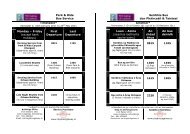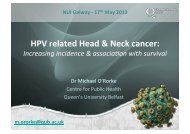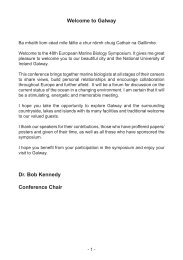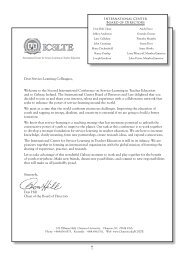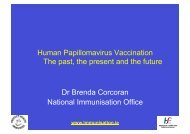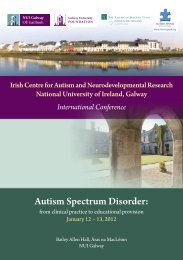Slides - Conference.ie
Slides - Conference.ie
Slides - Conference.ie
You also want an ePaper? Increase the reach of your titles
YUMPU automatically turns print PDFs into web optimized ePapers that Google loves.
Relationships and Sexuality Education and<br />
Autism<br />
13 January 2012<br />
Suzanne Mc Canney<br />
Learning Support Manager<br />
Middletown Centre for Autism
Middletown Centre for Autism<br />
An Overv<strong>ie</strong>w
Middletown Centre for Autism<br />
To promote excellence throughout Northern Ireland<br />
and Ireland in the education of children and<br />
young people with Autism Spectrum Disorders in<br />
partnership with famil<strong>ie</strong>s and existing services
Centre Services<br />
‣ Middletown Centre for Autism is a cross border facility funded by<br />
the Department of Education, Northern Ireland and the<br />
Department of Education and Skills Republic of Ireland.<br />
‣ The Centre currently has three operational services, these are:<br />
‣ Advice and Guidance<br />
‣ Training<br />
‣ Research and Information
Introduction<br />
Adolescence is one of the most important developmental stages, with significant<br />
changes occurring in the social, physical and emotional aspects of a person’s<br />
life.<br />
• Individuals with autism spectrum disorders (ASD) mature physically and<br />
sexually according to normal developmental stages; however a young person<br />
with an ASD can develop normally in some areas of social and emotional<br />
understanding and have difficult<strong>ie</strong>s in others.<br />
• Famil<strong>ie</strong>s and schools are often concerned about the growing sexual behaviour<br />
in young people with ASD because it is generally not accompan<strong>ie</strong>d by a<br />
corresponding growth in the f<strong>ie</strong>ld of social know-how which often leads to<br />
socially embarrassing behaviour.<br />
• People often falsely bel<strong>ie</strong>ve that people with ASD are sexually immature or do<br />
not exper<strong>ie</strong>nce sexual attraction (Konstantareas & Lunsky, 1997), are unaware of<br />
their sexuality and are uninterested in intimacy (Sullivan & Caterino, 2008).
Introduction<br />
Sexuality education is usually taught when inappropriate behaviours are first<br />
seen (e.g. public masturbation) and when the intervention leads to a<br />
behaviour change considered meaningful to others (e.g. menstrual hyg<strong>ie</strong>ne)<br />
(Ruble &Dalrymple, 2003).<br />
Adolescents with ASD have the same sexual desires and fantas<strong>ie</strong>s as<br />
people who do not have ASD (Stokes, Newton & Kaur, 2007), and the<br />
success or failure encountered by young people during their sexual<br />
development impacts upon their ability to effectively transition into adulthood.
How the core features of autism impact on<br />
expression and understanding of sexuality<br />
and relationships.<br />
Communication<br />
Interaction<br />
Flexibility of Thought<br />
Sensory
Special Issues for Young People with<br />
Asperger’s Syndrome<br />
• Mood swings-young people will need help diffusing<br />
anger, sadness and anx<strong>ie</strong>ty.<br />
• Changes to bod<strong>ie</strong>s, emotions and fr<strong>ie</strong>ndships happen<br />
rapidly and can be especially bewildering.<br />
• Strong sexual feelings may result in inappropriate<br />
sexual behaviour unless the young person is very<br />
clear about boundar<strong>ie</strong>s.<br />
• The young person’s naiveté can lead to teasing or<br />
becoming the target of sexual predators (including on<br />
the internet).
Problems with Typical RSE<br />
Some books neglect the detail that may be<br />
appreciated by a fact loving person with autism.<br />
Typical resources do not take into account the<br />
social and emotional difficult<strong>ie</strong>s that characterize<br />
autism and assume that the young person is<br />
socially competent.<br />
RSE is a value laden subject and as such<br />
requires a theory of mind to understand other<br />
people’s opinion.
How to teach RSE to children<br />
with ASD<br />
• Use the same visual strateg<strong>ie</strong>s that used to<br />
teach other skills (schedules, work systems etc)<br />
• Use a consistent approach at home and school<br />
• Put your own judgements, prejudices or issues<br />
aside- these may be meaningless to the<br />
adolescent with autism<br />
• Before teaching social/sexual skills, the<br />
person’s individual preferences, strengths and<br />
communication skills should be assessed.<br />
• It is recommended that a thorough functional<br />
behavioural assessment (FBA) is undertaken<br />
(Lee, 2004; Sterling-Turner & Jordan, 2007) as<br />
part of this individualised approach.
How to teach RSE to children<br />
with ASD<br />
Be clear:<br />
• What you are trying to teach<br />
• That what you are doing is pitched at<br />
the right level and is meaningful for the<br />
individual<br />
• Teaching should be less about “what<br />
erections are and why they occur” and<br />
more about what to do when they have<br />
one.<br />
• Focus on independence – they’ll soon<br />
be an adult
Key Issues in Communicating About<br />
RSE<br />
• Reduce social demands by reducing eye<br />
contact.<br />
• Take opportunit<strong>ie</strong>s to talk about feelings as<br />
well as facts.<br />
• Help young people understand that crushes<br />
are normal, temporary and okay so long as<br />
they are not pursued to the point of<br />
harassment or stalking.<br />
• Do not rely on euphemisms, use correct<br />
terminology.<br />
• Remember your sense of humour!
Key Issues in Communicating<br />
About RSE<br />
Use both proactive and reactive strateg<strong>ie</strong>s.<br />
• Proactive strateg<strong>ie</strong>s educate young people<br />
about sex and relationships and<br />
• Reactive strateg<strong>ie</strong>s support them during<br />
instances of sexually inappropriate<br />
behaviour.
What about sexual behaviour?
Sexual Behaviours<br />
Sexual behaviour includes self-image, emotions, values, attitudes, bel<strong>ie</strong>fs,<br />
behaviours and relationships. To parents and carers, it is the observable<br />
behaviours that are the most obvious of these, for example masturbation.<br />
• Approximately 75% of people with ASD display some kind of sexual<br />
behaviour and most masturbate (Sullivan & Caterino, 2008).<br />
• It is normal to express sexuality within the confines of one’s social networks<br />
(Koller, 2000).<br />
• It is important to note that up to 30% of young people with ASD exper<strong>ie</strong>nce<br />
an increase in behaviours of concern during adolescence (Eaves & Ho, 1996).<br />
• The transition from childhood to adolescence may also coincide with<br />
emerging social interest of some degree for individuals with ASD (McGovern &<br />
Sigman, 2004)
Sexual behaviours of concern<br />
in people with ASD<br />
• Touching private body parts<br />
• Removing clothes in public<br />
• Masturbating in public areas<br />
• Touching others inappropriately<br />
• Discussing inappropriate sexual subjects<br />
• Looking up shorts, skirts, dresses or down shirts<br />
• Obscene gestures<br />
• Non-consensual hugging<br />
• Inappropriate remarks and suggestions that have<br />
sexual connotations<br />
• Echolalic repetition of sexual terms<br />
• Perseveration on sexual topics<br />
(Adapted from Lawr<strong>ie</strong> & Jillings, 2004 and Ray, Marks &<br />
Bray‐Garretson, 2004).
Sexual behaviours of concern<br />
in people with ASD<br />
There are a number of explanations for why sexual<br />
behaviours of concern may occur:<br />
• Inappropriate sexual conduct becomes the only<br />
alternative to seeking relationships<br />
• A young person tr<strong>ie</strong>s to copy an observed adult sexual<br />
behaviour<br />
• Attempts to make connections with peers using sexual<br />
information and behaviours<br />
• Exper<strong>ie</strong>nces of sexual abuse<br />
• Some medications can affect libido, sexual interest or<br />
drive. Others can make arousal and ejaculation<br />
difficult which may increase tendency towards<br />
compulsive masturbation and other sexual behaviours
Masturbation Issues<br />
The most common concerns associated with masturbation<br />
include:<br />
1. The person is considered to be unable to masturbate properly<br />
2. The person does not know how to masturbate<br />
3. The person is masturbating for long periods<br />
4. The person is masturbating inappropriately (such as in public<br />
areas)<br />
5 The person is using inappropriate objects or means to help<br />
them masturbate<br />
6. The person becomes frustrated or aggressive during or after<br />
masturbating<br />
7. The person masturbates to the point of self injury (Cambridge,<br />
Carnaby & McCarthy, 2003; Walsh, 2000).
Masturbation<br />
With regard to more concrete learners this<br />
generally concerns teaching:<br />
• Where and when to masturbate<br />
• Where and when not to masturbate<br />
• What to call masturbation
Inappropriate Masturbation<br />
• Interrupt the behaviour.<br />
• Remind the person of the appropriate time and place<br />
for masturbating.<br />
• Redirect the person to an activity that involves high<br />
concentration, lots of physical activity or the use of<br />
both hands.<br />
• Provide reinforcement for staying on the assigned<br />
task.<br />
• Redirect the person to a more appropriate location.<br />
• Provide visual schedule which includes private time<br />
breaks so that the person can anticipate and plan for<br />
personal needs.
• Approach teaching these skills as you<br />
would any other.<br />
• Leave your embarrassment and personal<br />
judgements at the door.<br />
• Teach as a rule.
• Don’t assume the young person will<br />
generalise the skill to different environments.<br />
• Young people may need to be taught an<br />
appropriate place for ‘private time’ at Nan’s<br />
too.<br />
• Don’t expect or assume the young person will<br />
be able to internalise the skill.<br />
• It’s OK and normal if they always need the<br />
visual supports.
Key Issues<br />
• Stress the issues being dealt with are<br />
typical and normal.<br />
• Presentation style-matter of fact, no<br />
embarrassment or shirking issues.<br />
• Do not discuss own personal judgements<br />
and values.<br />
• Careful use of humour- enough to rel<strong>ie</strong>ve<br />
tension, but focus on teaching.
Keep up to Date with Events at the Centre<br />
www.middletownautism.com<br />
Follow us on Twitter @autismcentre<br />
Find Middletown Centre for Autism<br />
on Facebook



